Advancing Geography and the Association at Boston
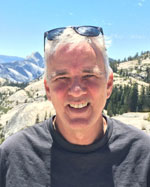 This month geographers from around the country and the world will gather in Boston for the AAG Annual Meeting. This should be a time of celebration for geographers. It is an occasion when we get together for exciting exchanges of ideas, reminisces with old friends and the chance to make new ones. In looking at the recent trajectory of our discipline and the AAG there is much to celebrate. However, it would be naïve to think that we do not also face some challenges. Some of these challenges are external, but some arise internally from the pressures created by the rapid growth and intellectual expansion of our discipline. Let’s take a look at all of this, and then consider some ideas on how at Boston we can derive maximum benefit and mitigate the challenges at hand.
This month geographers from around the country and the world will gather in Boston for the AAG Annual Meeting. This should be a time of celebration for geographers. It is an occasion when we get together for exciting exchanges of ideas, reminisces with old friends and the chance to make new ones. In looking at the recent trajectory of our discipline and the AAG there is much to celebrate. However, it would be naïve to think that we do not also face some challenges. Some of these challenges are external, but some arise internally from the pressures created by the rapid growth and intellectual expansion of our discipline. Let’s take a look at all of this, and then consider some ideas on how at Boston we can derive maximum benefit and mitigate the challenges at hand.
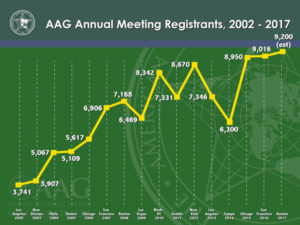 The AAG expects to host well over 9,000 registrants at the Boston meeting. This will be a record for the Association. The registrants come from countries around the world, including many from developing regions to whom the AAG offers special membership assistance. The size of the Boston meeting is not a singular fluke and should be viewed in the context of the remarkable growth of our annual meetings over the 21st century. Just 15 years ago our annual meetings had less than 4,000 attendees. Since that time there has been a strong, albeit sometimes noisy, increase in attendance.
The AAG expects to host well over 9,000 registrants at the Boston meeting. This will be a record for the Association. The registrants come from countries around the world, including many from developing regions to whom the AAG offers special membership assistance. The size of the Boston meeting is not a singular fluke and should be viewed in the context of the remarkable growth of our annual meetings over the 21st century. Just 15 years ago our annual meetings had less than 4,000 attendees. Since that time there has been a strong, albeit sometimes noisy, increase in attendance.
As one might expect, the rise in annual meeting attendees is matched by a similar increase in the Association’s membership. Since the early 2000s the Association membership has climbed from less than 7,000 members to almost 12,000. As impressive as it is, this figure does not begin to reflect the exciting growth in the breadth of the AAG membership. About a third of the membership is international, coming today from 96 countries. About 9 percent of the total membership is from developing regions and can take advantage of the AAG’s Developing Regions Program. This is a program I hope to see expanded in terms of benefits and numbers moving forward. It is also reassuring that about 42 percent of our members are students. They are the future of geography and the AAG. The recent addition of an official student representative to the Council affirms the commitment of the AAG to building that future.
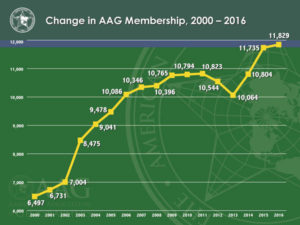 The growth in AAG membership and meeting attendance has occurred hand-in-hand with an increase in what the Association and meetings offer in terms of scholarly and intellectual exchanges and stimulation. At present there are almost 70 AAG Specialty and Affinity Groups – with more being proposed as new areas of geographical scholarship arise. Today these groups range in interest from A (Africa) to W (Water Resources). The astounding breadth of modern geographical enquiry is manifest in the number of oral and poster sessions at the annual meeting. This year in Boston there will be almost 1,800 various sessions. I find this incredible. Surely there will be a plethora of sessions that will appeal to any geographer.
The growth in AAG membership and meeting attendance has occurred hand-in-hand with an increase in what the Association and meetings offer in terms of scholarly and intellectual exchanges and stimulation. At present there are almost 70 AAG Specialty and Affinity Groups – with more being proposed as new areas of geographical scholarship arise. Today these groups range in interest from A (Africa) to W (Water Resources). The astounding breadth of modern geographical enquiry is manifest in the number of oral and poster sessions at the annual meeting. This year in Boston there will be almost 1,800 various sessions. I find this incredible. Surely there will be a plethora of sessions that will appeal to any geographer.
So, based on the accounting above one can conclude that the state of the AAG is good – and indeed continues to grow in terms of membership and the span of geographical scholarship. However, we still face some important challenges. In terms of external challenges, some of these take aim at our core values of open and free geographical research and dissemination of information and the free travel and association of our members. As I have written before, proposed Federal Legislation in the U.S. would curtail the collection, dissemination and study of geospatial data on racial disparities. This past year many academics and teachers in Turkey have been arbitrarily dismissed following the recent failed coup. Exactly how many geographers there have experienced this is unknown at this time.
The proposed U.S. travel ban on citizens from Iran, Iraq, Libya, Somalia, Sudan, Syria and Yemen excludes those members from travel to the United States and attendance of our Annual Meeting. It has been reported to the AAG that members from visa-waiver countries may be asked to obtain special visas to enter the U.S. because they have visited and conducted research in countries such as Iraq in recent years. In addition to these direct actions, the travel ban and the anti-Muslim and anti-immigrant rhetoric associated with the current Presidential Administration has made some AAG members unwilling for personal or political reasons to travel to the U.S. to attend the Annual Meeting. I have heard from many of you about your concerns in regards to the immigration situation and have been offered suggestions on what the AAG should or should not do policy-wise. I myself have friends, both Muslim and non-Muslim, who decided not to attend the Boston meeting.
I respect the views that members have shared and the decisions they have made. I also believe that we are strongest standing together to defend human and scholarly freedoms and rights – and that the AAG annual meeting provides a place where we can all come together to discuss these issues and chart courses of action. The Council and staff at the AAG are trying our best to rise to these external challenges at the Boston meeting and beyond.
To respond to the issues discussed above and to assist our members, the AAG has taken a number of specific actions. We have issued a new public statement condemning the revised travel ban. We have put in place mechanisms for those from countries named in the travel ban to participate by proxy or remotely at the Annual Meeting. We have collated online immigration information and sources of help for any of our attendees who encounter immigration issues. You can get information on all of this and more of the AAG actions on the AAG Policy Action page. Finally, through special sessions and other activities, the AAG has provided a chance for members to both learn about some of the policy-related challenges we face and to directly share your views and help guide our association. Two of these include “The 2016 U.S. Elections: Implications for Geography and Beyond” with discussions by past and present Presidents of the AAG and “Need for Public Intellectuals in a Trump America: Strategies for Communication, Engagement, and Advocacy,” organized by AAG Vice President Derek Alderman. Learn about all that is going on in this regard at the Boston meeting at our Boston Policy Actions page.
In addition to external challenges, the growth of our membership and our annual meetings raise their own internal challenges for the AAG. Geography and the AAG have become very large enterprises indeed, spread across a huge range of specialties and sub-disciplines. How might this impede our sense of identity as geographers, our sense of community, and the internal synergies that might develop in a smaller group? On a practical basis – our size and scope means that our annual meetings must include many concurrent sessions, making it difficult to “explore” areas of geography outside of one’s discipline. There seems to be precious few moments with all that is going on to sit and converse with other geographers – strengthening old collaborations and forging new ones. No single session, plenary or otherwise, can possibly bring all of us together in a room to hear about new breakthroughs or share thoughts on the future of the discipline and the AAG. Older members lament the loss of a more intimate meeting. With our meeting attendance at record levels, the large number of attendees and sessions that must be accommodated also means that there are a limited number of cities and convention centers that can host the Annual Meeting. In general the venue now has to be in larger and often more expensive cities. This means that some faculty and students find it hard to attend the meeting due to distance from potential venues or the costs of accommodation. As our Specialty and Affinity Groups have multiplied in response to the growing scope of the discipline of geography, our electronic communities also become more fragmented. Unless we actively work at maintaining some sense of an overall geography community we face the danger of becoming distant strangers to each other within our own discipline.
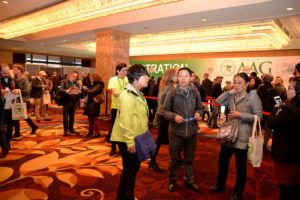
I have also learned as President that the sheer size of the Association and our Annual Meeting can foster a feeling of estrangement between some members and the Council and staff. The Council are elected from the membership and strive to do the best for the members and the sustainability of the Association. With almost 12,000 members it is hard to be cognizant of all the concerns or ideas for improvement that are circulating – and clearly impossible given the multifaceted diversity of our membership and their geographical interests to satisfy everyone all the time. The meeting should be a time for members, Council and staff to meet and both formally and informally share views. This interaction is difficult to easily accomplish during the rich and hectic schedule afforded by our Annual Meeting. In an effort to help with this situation, the Council will be holding a Town Hall early in the meeting (Wednesday, 4/5/2017, from 11:50 AM – 12:30 PM in Commonwealth, Sheraton, Third Floor). Come out and talk with us.
So, our successes in terms of membership and meeting attendance, and in building international and disciplinary diversity, puts its own pressures on the AAG and its members. I would not, however, want to see our membership shrink or retreat from the many horizons we are exploring. The days of geography as a numerically small or scholarly parochial discipline are behind us and not lamented. As I have argued, geography and geographers have a very important role to play in the world today both within and outside the academy.
How then do we counteract the centrifugal and entropic forces we face? I suppose the real solution starts with each and every one of us working to be the matrix that builds and maintains the critical mass we need to grow and illuminate even more brightly the nova that geography is creating in the 21st century. That means at its foundational level individually taking the time at the meeting and elsewhere to get to know the wide diversity of geography and geographers that comprise the AAG.
How about we all agree to attend one or two talks outside our sub-discipline? Attend some of the plenaries, major sessions and guest presentations and add your voice to the discussion during the Q/A. Come to meet the Council members at the registration area where we will be on duty throughout the meeting to hear your views and answer your questions individually. Why not put the smartphone down for a moment during lulls in the program and introduce yourself to the geographer sitting next to you and ask who they are, where they are from and what interests them? How about this year we all try to use the Annual Meeting not just to augment our knowledge about our own area of interest, but strive to enrich ourselves and others by learning more about the wider discipline and the geographers working in those other areas. Yes, there will be 9,000 people attending the Boston meeting, a daunting number, but let’s look at this as 9,000 opportunities to become and create more informed geographers and build a stronger and more cohesive discipline. The building of a better geography and AAG needs your voice, your ideas and your engagement with each other. Get out there and introduce yourself!
Join the conversation on Twitter #PresidentAAG
—Glen M. MacDonald
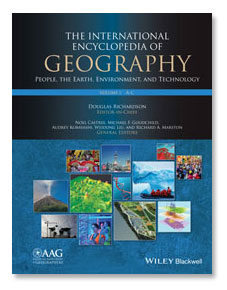 The AAG and an international team of distinguished editors and authors announce a new major reference work for Geography: The International Encyclopedia of Geography: People, the Earth, Environment, and Technology.
The AAG and an international team of distinguished editors and authors announce a new major reference work for Geography: The International Encyclopedia of Geography: People, the Earth, Environment, and Technology.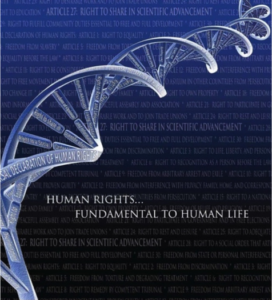 This special theme will feature 50 sessions with more than 250 presentations at the intersection of human rights and geography and will build on the AAG’s decade-long initiatives in this area. Speakers from leading international human rights organizations, academia, government, and NGOs will address human rights challenges around the world.
This special theme will feature 50 sessions with more than 250 presentations at the intersection of human rights and geography and will build on the AAG’s decade-long initiatives in this area. Speakers from leading international human rights organizations, academia, government, and NGOs will address human rights challenges around the world.
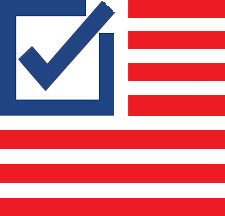 This series of sessions will focus on analysis and research on the 2016 U.S. election, and what the results may mean for geography, the nation, and our planet.
This series of sessions will focus on analysis and research on the 2016 U.S. election, and what the results may mean for geography, the nation, and our planet. 
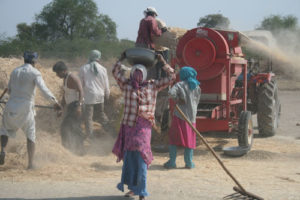 Burgeoning global population along with increasing appetite for high-protein or resource demanding food choices may double demands on world agriculture by 2050. At the same time groundwater depletion and climate change are negatively impacting the availability of sufficient water to meet agricultural and domestic freshwater demands in many regions. Compounding these challenges are socioeconomic forces, including armed conflicts and state collapse that negatively affect agricultural productivity, food transference and water resources. The challenges to food and water security over the 21st century represent an increasing and potentially existential threat to global society. These issues are fundamentally geographical in nature and form a central research and educational focus of geography and the AAG special theme.
Burgeoning global population along with increasing appetite for high-protein or resource demanding food choices may double demands on world agriculture by 2050. At the same time groundwater depletion and climate change are negatively impacting the availability of sufficient water to meet agricultural and domestic freshwater demands in many regions. Compounding these challenges are socioeconomic forces, including armed conflicts and state collapse that negatively affect agricultural productivity, food transference and water resources. The challenges to food and water security over the 21st century represent an increasing and potentially existential threat to global society. These issues are fundamentally geographical in nature and form a central research and educational focus of geography and the AAG special theme.
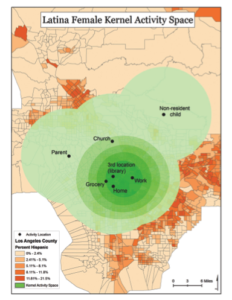 Uncertainty and context pose fundamental challenges in geographic research and GIScience. Geospatial data are imbued with error (e.g., measurement and sampling error), and understanding of the effects of contextual influences on human behavior and experience are often obfuscated by various types of uncertainty (e.g., contextual uncertainties, algorithmic uncertainties, and uncertainty arising from different spatial scales and zonal schemes). To generate reliable geographic knowledge, these uncertainties and contextual issues will be addressed within the special theme.
Uncertainty and context pose fundamental challenges in geographic research and GIScience. Geospatial data are imbued with error (e.g., measurement and sampling error), and understanding of the effects of contextual influences on human behavior and experience are often obfuscated by various types of uncertainty (e.g., contextual uncertainties, algorithmic uncertainties, and uncertainty arising from different spatial scales and zonal schemes). To generate reliable geographic knowledge, these uncertainties and contextual issues will be addressed within the special theme.
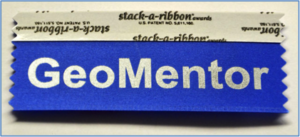 Display Area: Check out the GM display, located on the same floor as registration, for program information and to ask questions to program staff. We’ll give you a ribbon to sport on your name badge for the week! Tell your non-GeoMentor friends to come by too!
Display Area: Check out the GM display, located on the same floor as registration, for program information and to ask questions to program staff. We’ll give you a ribbon to sport on your name badge for the week! Tell your non-GeoMentor friends to come by too!